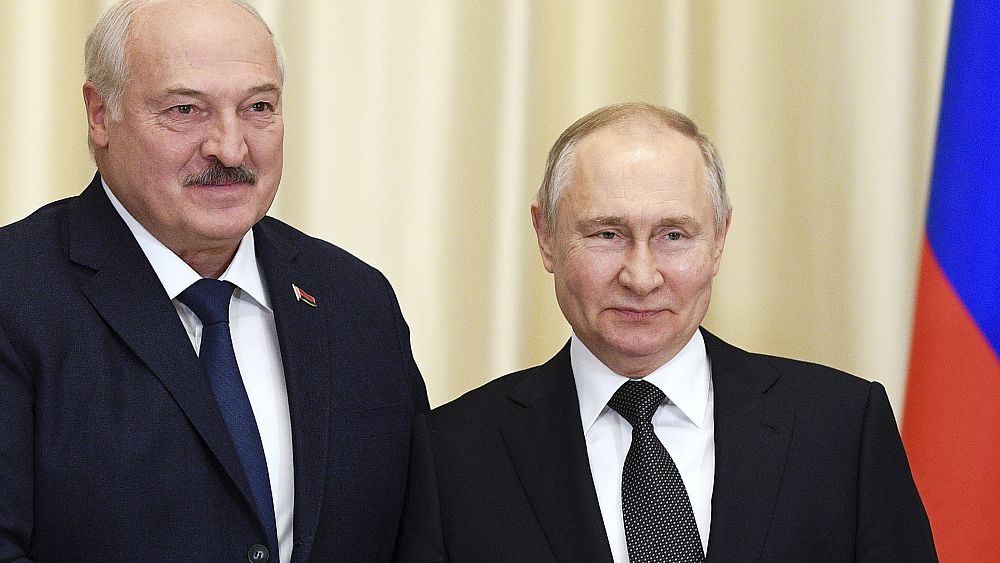Who are Russia’s allies a year after Putin’s full-scale invasion of Ukraine?

Belarus’ President Alexander Lukashenko, a close ally of Russia, was in China on Tuesday, for a high-profile bilateral meeting that has raised eyebrows in the West.
His visit has fuelled fears that Beijing is still considering providing military assistance to Moscow, despite China refuting the allegations as a “smear campaign”.
Nonetheless, the meeting underscores the reality that over a year after Russia’s full-scale invasion of Ukraine, Moscow still has international partners and allies.
Five countries voted against a UN resolution on 2 March 2022 calling on Russia to “immediately cease the use of force against Ukraine” and to “fully and unconditionally withdraw all its armed forces”. They are Russia, Belarus, Syria, North Korea and Eritrea.
Since then, Russia has been working in front of and behind the scenes to seek new strategic partners at the international level or to deepen existing relations.
So who is still standing by Russia and why?
Russia’s closest ally: Belarus
Russia’s neighbour is also its most important military ally and shares deep cultural and economic ties. In the early stages of the war, Belarus was a key staging ground for Russia’s assault on the north of Ukraine and Kyiv, with Moscow conducting military drills there and using its airspace.
Since the disputed Belarusian elections in 2020, the fate of its leader Alexander Lukashenko seems to be tied to Russian President Vladimir Putin. Russia played a decisive role in ensuring that massive anti-government protests were suppressed, giving it power over Belarus’ fate.
According to Anaïs Marin, an associate fellow of the Russia and Eurasia Programme at Chatham House, “the Belarusian government has been fully subjugated by its Russian ally.” She added that “the very agency of Belarus as an international actor is under question right now”.
Russia has continued to station forces there, leaving open the possibility of another ground assault on Kyiv, although Belarus has stopped short of joining the war with its own forces.
Moscow’s superpower friend
Ahead of the February 2022 invasion, Beijing and Moscow said their friendship has ‘no limits’, amid increasing animosity between the two powers and the West.
China is yet to condemn the war in Ukraine and has even refused to describe Moscow’s attack as an ‘invasion’. It has heavily attacked the Western response to the war, notably criticising sanctions placed on Moscow.
Yet, China has also been impacted by the war, in the form of supply-chain disruption and rocketing hydrocarbon prices.
It recently unveiled its own peace plan for Ukraine, which included a point on “respecting the sovereignty of all countries”, although it didn’t spell out what this meant specifically for the country.
Ukraine’s President Volodomyr Zelenskyy requested a meeting with his Chinese counterpart to discuss the proposals. But can China be a reliable mediator?
According to Marin, “this peace plan proposal is perceived, at least in the West, as very supportive of Russia and demanding basically that Ukraine makes concessions that will be seen as unacceptable both in Kyiv and in most Western capitals”.
India
Meanwhile, India, like China, has increased imports of crude oil and natural gas from Russia since the war began. The country has long-standing ties to Russia through its cold-war friendship with the Soviet Union. It buys a lot of weapons from the Kremlin, which together with growing hydrocarbon purchases helps finance Russia’s war.
Yet, despite abstaining from most UN resolutions condemning Russia’s actions in Ukraine, Delhi has come close to openly criticising the Kremlin. “Today’s era is not an era of war,” pronounced the Indian Prime Minister, Narendra Modi, imploring Putin to “move onto a path of peace”, during a meeting in September 2022.
The ‘on the fence’ group
Many other countries, notably in Latin America and Africa, have sought to walk a tightrope between the two sides. They have made vague appeals for peace without openly criticising Russia. Some have even increased economic and military ties with the Kremlin.
In Brazil, for example, President Luiz Inacio Lula da Silva has talked of the country’s ‘strategic’ links with Russia, particularly its growing trade in diesel and fertilisers.
Despite trying to position himself as a peacemaker and floating his own plan of creating a group of countries to mediate peace talks, Lula’s previous comments have fuelled Russia’s argument that it is not to blame for the war.
“This guy [Zelenskyy] is as responsible as Putin for the war”, he claimed in an interview with Time Magazine in May 2022, which was met with an angry response from Ukrainian officials.
Moscow’s increasing friendship with some African nations
Since the invasion of Ukraine, Russian Foreign Minister, Sergei Lavrov, has sought to turn away African nations from the West, saying that they still harboured “colonial instincts”.
He carried this message to several large nations, such as the Democratic Republic of Congo, Ethiopia and South Africa.
In the latter, which has a long history of friendship with Russia due to Soviet opposition to the apartheid regime, naval drills were held with Moscow and China off its coast.
Mali is another country to turn away from the West, notably France. Following a coup d’état in May 2021, it has increasingly relied on mercenaries from the Russian Wagner Group, which is also fighting in Ukraine.
